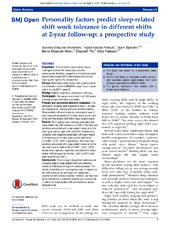| dc.description.abstract | Objectives: The aim of the present study was to investigate whether the personality variables morningness, flexibility, languidity and hardiness could predict sleep-related shift work tolerance for the day, evening and night shifts, respectively. Design: Prospective study design with questionnaires administered in winter 2008/2009 (wave 1) and 2 years later in spring 2011 (wave 3). Setting: Different healthcare institutions in Norway. Participants: The sample comprised in all 700 nurses working a three-shift rotating schedule. Primary and secondary outcome measures: The personality variables were assessed at wave 1, as were the demographic, lifestyle and work-related variables. Sleep-related shift work tolerance, assessed at wave 3, was measured separately for the day, evening and night shifts with the Bergen Shift Work Sleep Questionnaire. Results: Morningness was positively associated with sleep-related day shift tolerance (p<0.001). Flexibility was positively associated with sleep-related tolerance for the evening as well as night shift (p<0.001). Furthermore, languidity was negatively associated with sleep-related shift tolerance for the day, evening and night shifts (p<0.001, <0.01, <0.05, respectively). Hardiness was positively associated with sleep-related tolerance for the day, evening and night shifts (p<0.001, <0.01, <0.05, respectively). Age was negatively associated with sleeprelated shift tolerance for the day, night (p<0.01) and evening shifts (p<0.001). Conclusions: The findings indicate that hardiness and languidity predict sleep-related shift work tolerance across all shift types among shift working nurses. The effects of flexibility and morningness seem to depend on the shift schedule. By and large, our results are in accordance with previous studies; however, we have now demonstrated the prospective importance of personality in relation to sleep-related shift work tolerance across different shifts. | en_US |

